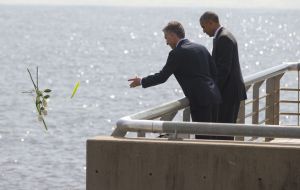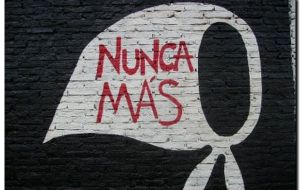MercoPress. South Atlantic News Agency
Obama pays homage to victims of Argentine dictatorship and admits “US was slow to speak out for human rights”
 US “has to examine its own policies as well, and its own past,” said Obama.“We've been slow to speak out for human rights, and that was the case here.”
US “has to examine its own policies as well, and its own past,” said Obama.“We've been slow to speak out for human rights, and that was the case here.”  Alongside president Macri, Obama tossed white roses into the River Plate in memory of those executed by the regime 1976/1983
Alongside president Macri, Obama tossed white roses into the River Plate in memory of those executed by the regime 1976/1983  “You are the ones who ensure that the past is remembered and the promise of 'nunca mas' is finally fulfilled.”
“You are the ones who ensure that the past is remembered and the promise of 'nunca mas' is finally fulfilled.”  Obama's visit to Argentina coincided with the 40th anniversary of a right-wing military coup and dictatorship, which led to years of the so called “dirty war”.
Obama's visit to Argentina coincided with the 40th anniversary of a right-wing military coup and dictatorship, which led to years of the so called “dirty war”. President Barack Obama paid homage on Thursday to victims of Argentina's former US-backed dictatorship, admitting the United States was “slow to speak out for human rights” in those dark days. Obama became the first US president to formally acknowledge the victims of the 1976-1983 military regime, which declassified documents have revealed was supported by top US officials.
“There's been controversy about the policies of the United States early in those dark days,” Obama said in a speech at the Memory Park monument in Buenos Aires.
The United States “has to examine its own policies as well, and its own past,” he added. “We've been slow to speak out for human rights, and that was the case here.”
Alongside Argentina's President Mauricio Macri, Obama tossed white roses into the River Plate in memory of those executed by the regime, tortured to death, by shooting and by being hurled from airplanes into the water in so-called “death flights.”
Obama's visit to Argentina coincided with the 40th anniversary of a right-wing military coup which ushered in the dictatorship, and years of the so called “dirty war”.
Victims' groups had been angered by the choice of the date for Obama's visit, given the US support for the coup at the time. But they welcomed his promise to declassify further documents to shed more light on the fates of victims of the regime.
Paying tribute to victims' families, Obama reprised a historic phrase from the 1985 trial of Argentina's dictators, that “never again” (“nunca mas”) must dictators prevail.
“To those families, your relentlessness, your determination has made a difference. You've driven Argentina's remarkable efforts to hold responsible those who perpetrated these crimes,” he said.
“You are the ones who ensure that the past is remembered and the promise of 'nunca mas' is finally fulfilled.”
In 2002, Washington declassified 4,000 diplomatic cables which showed US officials, including then-secretary of state Henry Kissinger, encouraged the Argentine junta's purge of leftists.
In a strategic gesture, Obama agreed ahead of his visit to declassify other sensitive military and intelligence records linked to the “dirty war.”
They may shed more light on US involvement in “Operation Condor,” a plan among secret police agencies across the Southern Cone to target communists, leftists and dissidents.
“Prior US government releases have detailed human rights abuses and US policymaking in Chile, Guatemala, El Salvador,” said Carlos Osorio at the National Security Archive.
Macri had asked for the further documents to be released. “We all need and we are entitled to know what the truth is,” he said.
After the memorial ceremony the Obamas went to the airport to fly to the Patagonia resort town of Bariloche for a few hours' leisure time, before returning to Washington.




Top Comments
Disclaimer & comment rules-

-

-

Read all comments#6: First let me tell you that from our point of view, With what we all know about the “School of the Americas” where most SA dictators learned how to torture and how to “combat” comunism, it is of great admiration, having a visit of a US president recognizing they will open their archives and study their involvement in those dark years. It just never happened before.
Mar 25th, 2016 - 03:26 pm +1Many dictatures were fabricated in the Pentagon, believe or not. The Pinochet Regime for example, was organized by Kissinger, and there are lots of proof about it.
It is not that the USA was the evil in all this. We as a people failed to prevent this kind of regimes in the past but it is good for us all to try to learn from our mistakes and that is what i see in Obama visit on a day to remember in Argentina.
About Guantanamo and the secrets concentration camps in Europe. They have no arrested people. Becouse if the people detained there have not the single juridical representation, under what charges are they arrested?. How do you know they are not a victim? How do you know they deserve to be there? How do you know they are terrorist?.
In the 70's in Argentina, with the military dictature, politicals oponents, childrens asking for a reduction of their transport costs, innocent people were dissapeared, kidnapped, tortured and killed under accusation of terrorism. They had not the basic juridical right to defend themselves. But to the common people the dictature said they were fighting terrorism.
So, what im saying is that im not posting against the US people, im posting against its policies. All nations have its past and present wrongs. After all what Argentina have been through, there are still people here who liked the military dictature. You having governments that prays around the world about democracy, should not have concentration camps for people without a right to defend themselves.
Kirchner, did some good things, but lack the most basic diplomatic skills destroying Argentina's institutions.
A very disappointing collection of posts above--with the exception of Liberato's excellent points--that depart in all directions and avoid addressing the central point: does the end justify the means?
Mar 25th, 2016 - 06:55 pm +1The Argentine dictators felt they had a right to hold people of all ages and condition in secret locations where torture did not know limits, to defend what they called the “Traditional, Western and Christian” order.
Their goals included benefiting the civic component of the coup: the agro-export sector and the rest of the country's elite.
Making the best out of a sad period, Argentina however ended up submitting the many suspects to trial--with legal guarantees the victims were denied.
Of 2,354 imputed persons, 669 were sentenced and 62 were acquitted.
Of the sentenced, about half are under house arrest.
That's more than enough to be proud of the Argentina that emerged from such horror.
#16 Jack Bauer: Won't respond to this shallow, YB-like post. It speaks about the author better than I could ever do.
#19 chronic
Mar 25th, 2016 - 09:26 pm +1Prey tell, chronic:
Which are the individual rights that would have been protected by the Argentine military junta in the 1970s when they proceeded to kidnap, torture and murder thousand of individual Argentines--some foreigners too--without a shadow of legal process?
Commenting for this story is now closed.
If you have a Facebook account, become a fan and comment on our Facebook Page!